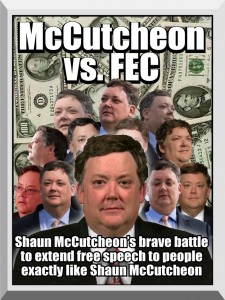 “The first third of your campaign is money, money, money. The second third is money, money, and press. And the last third is votes, press, and money.”
“The first third of your campaign is money, money, money. The second third is money, money, and press. And the last third is votes, press, and money.”
-Rahm Emanuel
 Everyone knew it was coming. In the sewage-strewn wake of Citizens United there could really be only one outcome to McCutcheon vs. FEC, one of the biggest cases heard by the Supreme Court this summer. There was only one way to decide the case IF the goal was an open, healthy democracy, and only one way to decide it IF the goal was to funnel even more power to the soulless corporations and sociopaths who pull the strings of our government. The Supremes decided just as everyone dreaded and expected, and the only people happy about it are the less-than-a-thousand who are waiting, like Wal-Mart shoppers on Black Friday, to rush through the now-open door and make their best deal on the shreds of our Republic. The rest of us? We huddle outside, cold in the rain, disenfranchised, defeated, and Furious.
Everyone knew it was coming. In the sewage-strewn wake of Citizens United there could really be only one outcome to McCutcheon vs. FEC, one of the biggest cases heard by the Supreme Court this summer. There was only one way to decide the case IF the goal was an open, healthy democracy, and only one way to decide it IF the goal was to funnel even more power to the soulless corporations and sociopaths who pull the strings of our government. The Supremes decided just as everyone dreaded and expected, and the only people happy about it are the less-than-a-thousand who are waiting, like Wal-Mart shoppers on Black Friday, to rush through the now-open door and make their best deal on the shreds of our Republic. The rest of us? We huddle outside, cold in the rain, disenfranchised, defeated, and Furious.
 Here’s a brief history of the case… Shaun McCutcheon (that’s him in the photo at a University of Alabama tailgate party) contributed to 17 candidates in 2011-2012, and wanted to support 11 more with contributions of $1,776 each. (Nice touch, Shaun!) These
Here’s a brief history of the case… Shaun McCutcheon (that’s him in the photo at a University of Alabama tailgate party) contributed to 17 candidates in 2011-2012, and wanted to support 11 more with contributions of $1,776 each. (Nice touch, Shaun!) These contributions were under the per-candidate limit, but they were denied because they would have exceeded the per-cycle combined limit. That wasn’t enough democracy for Shaun, and he sued. His reasoning was that Congress had found individual contributions to be ‘non-corrupting’, and he could see no reason why many small contributions would be corrupting either. This insipid argument was enough for The Republican National Committee to jump on Shaun’s bandwagon, and the SCOTUS heard their arguments on October 8. The ironically named “Justices” decided to strike down the combined cap that had so crippled Shaun’s political participation. The only redeeming factor in their decision was that they refused to follow the bug-eyed fanaticism of Clarence Thomas, who thought all contribution caps should be erased. Clarence will probably sleep soundly, though, knowing he’ll get another bite at the apple soon.
contributions were under the per-candidate limit, but they were denied because they would have exceeded the per-cycle combined limit. That wasn’t enough democracy for Shaun, and he sued. His reasoning was that Congress had found individual contributions to be ‘non-corrupting’, and he could see no reason why many small contributions would be corrupting either. This insipid argument was enough for The Republican National Committee to jump on Shaun’s bandwagon, and the SCOTUS heard their arguments on October 8. The ironically named “Justices” decided to strike down the combined cap that had so crippled Shaun’s political participation. The only redeeming factor in their decision was that they refused to follow the bug-eyed fanaticism of Clarence Thomas, who thought all contribution caps should be erased. Clarence will probably sleep soundly, though, knowing he’ll get another bite at the apple soon.
This travesty has garnered outrage from all quarters, so if you’d like to dig deeper we’ve assembled some of the best facts and opinions we can find below. (By the way, when the McCutcheon case was heard in October, we wrote a little bit about it for that month’s Furious. There are some great links for more background from before the case was decided.) And if you’re as Furious as everyone else, we’ve also included a couple links to groups who continue to fight what seems to be an increasingly hopeless battle…
First, get the real deal without spin-
Full text of McCutcheon decision and dissent in PDF
Now, drink deep from the brimming goblet of Fury that is McCutcheon…
Here’s a few statistics for context…
The Supreme Court’s ruling in FEC vs. McCutcheon eliminated one of the few remaining limits on campaign donations, granting frightening new powers to the richest Americans, while providing no clear benefit to the rest of the population. McCutcheon eliminated the overall limit that individuals can give to candidates and parties in an election cycle. While the Court justified its ruling on the grounds of free speech, a pillar of democracy, a quick examination of the practical effects of McCutcheon shows that the ruling is anything but democratic.
Demos- Billion-Dollar Democracy: The Unprecedented Role Of Money In The 2012 Elections
The first presidential election since Citizens United lived up to its hype, with unprecedented outside spending from new sources making headlines. Demos and U.S. PIRG Education Fund analysis of reports from campaigns, parties, and outside spenders to the Federal Election Commission found that our big money system distorts democracy and creates clear winners and losers.
Now, some thoughts on the decision from various sources…
Huffington Post- The Supreme Court Has Struck Down Overall Campaign Contribution Limits
The decision relies heavily on the assertion in the 2010 Citizens United ruling that influence and access are not a corruption concern. “With the ruling, we continue to chip away at the long entrenched status quo from the grassroots — a status quo that has kept challengers, better ideas, and new entrants to the political arena mostly locked out,” McCutcheon said in a statement. “Ensuring that citizens are able to contribute to multiple candidates or causes who share their views only provides further support to a system in which ‘We the People’ hold the ultimate reins of power.”…
Mother Jones- The Supreme Court Just Gutted Another Campaign Finance Law. Here’s What Happened.
Hypothetically, a single donor can now contribute as much as $3.5 million, to be divvied up between candidates, PACs, and political parties. No single entity could receive any more than the legal limits, and when you add up all the contributions a donor could potentially make without the aggregate limits, you get $3.5 million. (The overall aggregate limit was raised to $123,200 for the 2014 cycle.)…
The Nation- The Supreme Court’s Ideology: More Money, Less Voting
In the past four years, under the leadership of Chief Justice John Roberts, the Supreme Court has made it far easier to buy an election and far harder to vote in one. First came the Court’s 2010 decision in Citizens United v. FEC, which brought us the Super PAC era. Then came the Court’s 2013 decision in Shelby County v. Holder, which gutted the centerpiece of the Voting Rights Act. Now we have McCutcheon v. FEC, where the Court, in yet another controversial 5-4 opinion written by Roberts, struck down the limits on how much an individual can contribute to candidates, parties and political action committees…
Common Dreams: In ‘Blow to Democracy,’ SCOTUS Strikes Down Campaign Contribution Limits
“This is truly a decision establishing plutocrat rights,” said Robert Weissman, president of Public Citizen, slamming the ruling as a “devastating blow at the very foundation of our democracy.” “Today’s decision in McCutcheon v. FEC is Citizens United round two, further opening the floodgates for the nation’s wealthiest few to drown out the voices of the rest of us,” said Miles Rapoport, president of Common Cause. “With these two rulings, corporations and billionaires like the Koch brothers will be able to use their money to buy more influence in more places, gaining a tighter grip on our government,” said Wenonah Hauter, executive director of Food & Water Watch…
Stephen Colbert- Campaign Funding
Sunlight Foundation- Sunlight’s Response to SCOTUS Ruling on McCutcheon v FEC
Once again, the Supreme Court has given more power to special interests and a tiny percentage of the very rich. Its Citizens United ruling four years ago opened up the floodgates for unlimited spending in our elections, and now it might as well have tied a big bow around Congress and deliver it to the 1%. By striking down the long-standing cap on total contributions individuals may give to federal candidates and political parties, the Supreme Court has permitted the unseemly spectacle of a single donor being able to contribute more than $3.5 million to one party during an election cycle (or double that, if he/she wants to hedge her bets)…
Common Cause- Again, U.S. Supreme Court Decides Against Democracy
The Roberts Court today continued its drive to give Americans a government of, by and for big money. “Today’s decision in McCutcheon v. FEC is Citizens United round two, further opening the floodgates for the nation’s wealthiest few to drown out the voices of the rest of us,” said Miles Rapoport, president of Common Cause. “The Court has reversed nearly 40 years of its own precedents, laid out a welcome mat for corruption, and turned its back on the lessons learned from the Watergate scandal,” said Rapoport. “This decision once again demonstrates the Court majority’s ignorance of the real world of American politics, the one in which big money buys big returns.”…
Bill Moyers- A Blistering Dissent in ‘McCutcheon’: Conservatives Substituted Opinion for Fact
What has this to do with corruption? It has everything to do with corruption. Corruption breaks the constitutionally necessary “chain of communication” between the people and their representatives. It derails the essential speech-to-government-action tie. Where enough money calls the tune, the general public will not be heard. Insofar as corruption cuts the link between political thought and political action, a free marketplace of political ideas loses its point. That is one reason why the Court has stressed the constitutional importance of Congress’ concern that a few large donations not drown out the voices of the many….
Think Progress- How The Supreme Court Just Legalized Money Laundering By Rich Campaign Donors
Chief Justice John Roberts begins his opinion in McCutcheon v. FEC with a flourish: “There is no right more basic in our democracy than the right to participate in electing our political leaders.” He then spends the next forty pages explaining why that participation includes the right of rich people to attempt to buy elections. Thanks to the decision Roberts and his four fellow conservative justices handed down today (Though Thomas did not join Roberts’ opinion, he wrote a more radical opinion calling for all limits on campaign donations to be eviscerated), wealthy donors now have a broad new power to launder money to political candidates — they just have to be a bit creative about how they do it…
Jon Stewart- Donors Unchained
Bernie Sanders- SCOTUS McCutcheon Decision Is A Koch Brothers ‘Gravy Train!’ (Video)
Senator Bernie Sanders offered up a chilling assessment of the Supreme Court’s McCutcheon ruling that, in effect, allows the wealthy to funnel unlimited money into an army of political lackeys. Sanders called it what it is: nothing more than a “gravy train” of Koch brothers money for Republicans. According to Sanders, the McCutcheon debacle undermines the very foundation of our democracy and allows millionaires and billionaires to “contribute even more money to the candidates of their choice and push a reactionary, right-wing agenda.”…
Believe it or not, there are a couple opposing opinions…
Newt Gingrich- Remove All Donation Limits To ‘Equalize The Middle Class And The Rich’
Speaking on ABC’s “This Week,” Gingrich cited the 1976 decision Buckley v. Valeo, which first equated with money with speech and said that to limit certain contributions was tantamount to limiting freedom of expression. Gingrich said that “you’ve gone from that original decision to Citizens United, which said, in effect, that corporations could give and created super PACs. Now you’ve said they’re unlimited.” Gingrich added, “The next step is the one Justice Clarence Thomas cited — candidates should be allowed to take unlimited amounts of money from anybody. And you would, overnight, equalize the middle class and the rich.”
Heritage Foundation- The First Amendment Triumphs at the Supreme Court
In a terrific decision this morning that will no doubt cause The New York Times to go into the same type of hysterics it exhibited after the Citizens United decision, the Supreme Court of the United States ruled against the Federal Election Commission. Today’s decision in FEC v. McCutcheon restores Americans’ First Amendment rights to…
Who’s fighting back, and how can you get involved…
Bill Moyers- What You Can Do to Make Your Voice Heard on ‘McCutcheon’ Right Now
Shortly after the decision in McCutcheon v FEC came down on Wednesday morning, campaign finance reform groups around the country activated their rapid response network to hold rallies in front of the Supreme Court building in Washington, DC, and 38 states. Groups like Public Citizen, Common Cause, MoveOn.org, Move to Amend and many, many others are “standing up against the pervasive, corrupting influence of an electoral system that auctions offices to the highest bidder and suppresses the vote of millions of Americans.” Over the course of the day on Wednesday, there were more than 140 protests…
Cenk Uygur- How We Can Fight Back Against the Supreme Court
Let me start by quoting two great men and a crook that died the other day. Thomas Jefferson said “The issue today is the same as it has been throughout all history, whether man shall be allowed to govern himself or be ruled by a small elite.” When asked if his payments to politicians had worked, Charles Keating replied, “I want to say in the most forceful way I can: I certainly hope so.”…
Democracy 21, and its education arm, Democracy 21 Education Fund, work to eliminate the undue influence of big money in American politics, prevent government corruption, empower citizens in the political process and ensure the integrity and fairness of government decisions and elections. The organization promotes campaign finance reform and other related political reforms to accomplish these goals.
Represent US A Movement for the People
Represent.Us is the non-partisan movement behind the American Anti-Corruption Act: a law that would overhaul campaign finance, impose strict lobbying and conflict of interest laws, and end secret political money. We are mobilizing millions of Americans to put an end to the culture of legalized corruption that has come to define modern politics. We believe that a government of, by, and for the people isn’t an idealistic fantasy — It’s non-negotiable. Visit anticorruptionact.org to read the full provisions of the Act and learn more.










